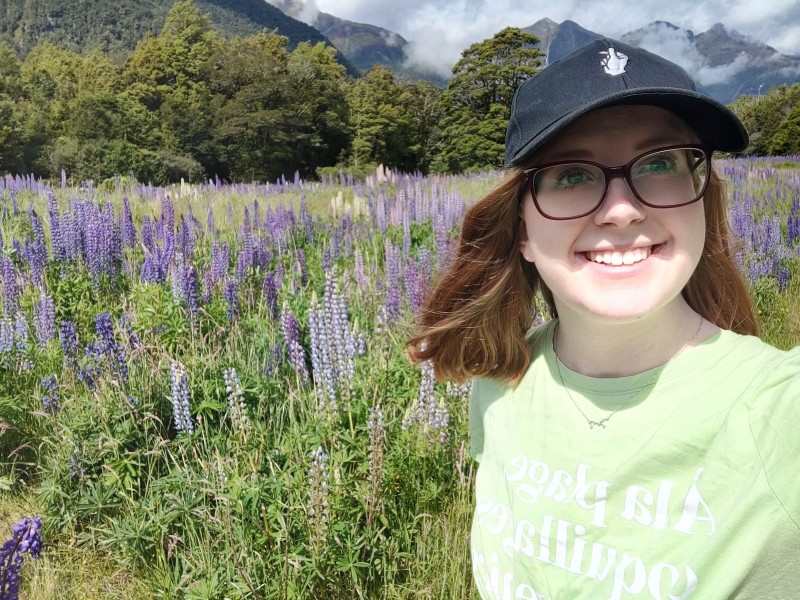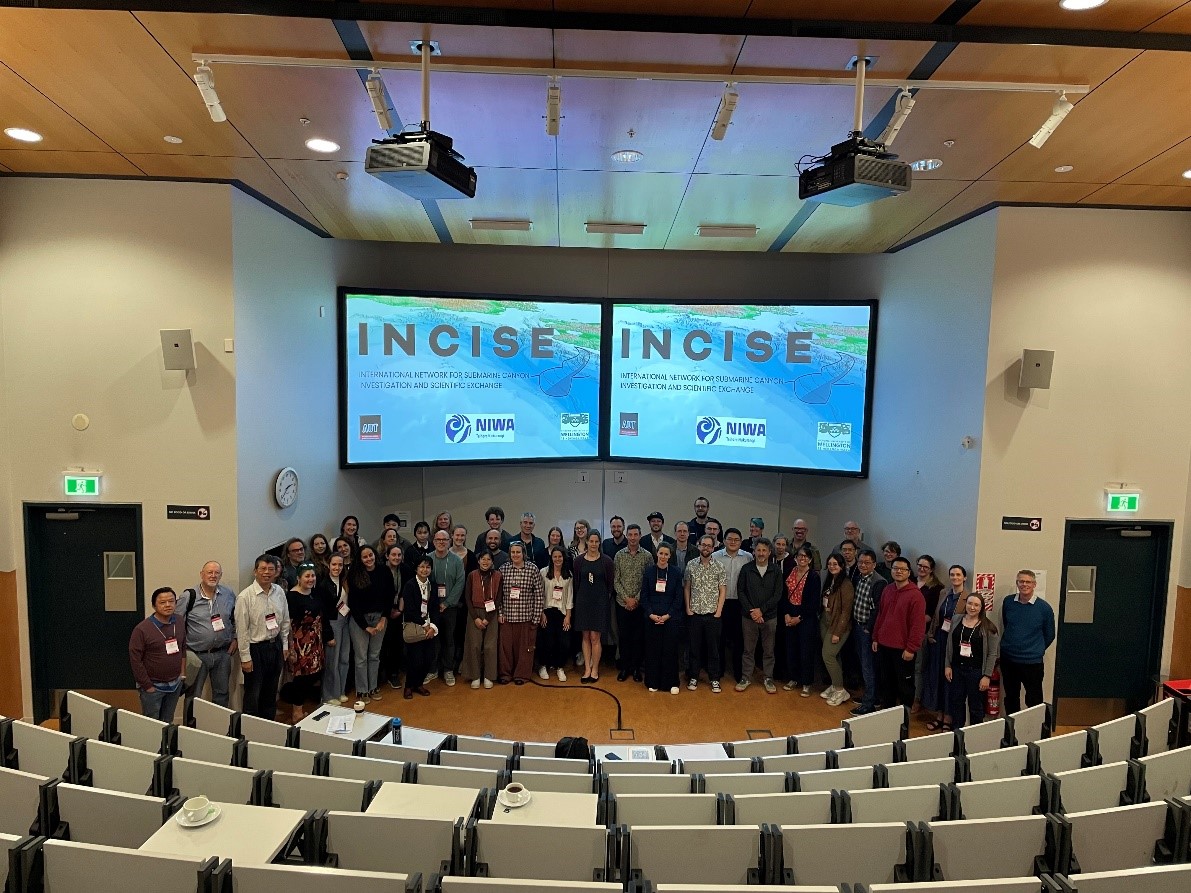The International Network for Submarine Canyon Investigation and Scientific Exchange Symposium 2023
Eilean MacDonald
University of East Anglia

INCISE is a network of scientists who all study different aspects of submarine canyons. The main aim of this network is to create links between different fields in the study of submarine canyons and stimulate cross-disciplinary discussion.
The 2023 INCISE Symposium was the 6th of its kind and this year was hosted by NIWA in Wellington Aotearoa New Zealand, 4th-7th December 2023. The venue was located in the Victoria University of Wellington’s (Te Herenga Waka) Pipitea Campus (Te Papa Akoranga o Pipitea), with a jam-packed programme including, workshops, working group discussions, talks and poster presentations as well as a conference dinner.

My journey began in Norwich on the 1st of December at 8am where I left for Heathrow, 36 hours later at 9am on the 3rd of December I flopped onto the bed in my hotel room in Wellington! My first day in Wellington consisted of mostly catching up on some sleep until later in the evening when I went out for dinner with a group of fellow submarine canyon scientists. This was a nice way to informally meet some of the people I would be spending time with over the next week.
The next day was a pre-symposium workshop on internal waves. This began with a welcome from Veerle Huvenne. The day consisted of talks from several keynote speakers along with interactive sessions. This was very beneficial to me as a large portion of my project is looking at the effects of these internal waves. It not only gave me a greater insight and understanding of internal waves in my sector of oceanography but also enlightened me about other important impacts of internal waves on biogeochemistry and internal wave analysis techniques. The day rounded off with an icebreaker in preparation for the start of the symposium the following day.
Day 1 of the conference began with a welcome from Veerle Huvenne, Joshu Mountjoy and Ashley Rowden. One thing I felt was very special is that the hosts organised for local Maori to welcome us into the space this is called a powhiri. This was followed by a series of talks and flash poster presentations on ‘carbon through canyons’, ‘processes shaping canyons’ and ‘canyon sediment transport’. The day was rounded off with a poster session. This session allowed me to learn more about current research happening outside of my sector in addition to meeting many more members of the community.
Day 2 consisted of the sessions, ‘canyons as havens for biodiversity’ and ‘anthropogenic impacts’ and again was rounded off by a poster session allowing for more discussion. This is one thing I very much enjoyed about this symposium, there was ample opportunity to have informal discussions at lunchtimes, poster sessions and coffee breaks. This added to the friendly feel of the symposium, and I never felt like there was no one I could talk to. After working group discussions, we all joined together later in the evening for a conference dinner which consisted of good food, company and music!
Day 3 was the last day of the symposium, and it rolled around very quickly! The last session was ‘Canyon current dynamics and influence on sediment transport’ and it was the session I was speaking in. I was presenting the research I had done to date on ‘Turbidity Within the Whittard Canyon System’. It was a great opportunity to present my research at this stage as I got some fantastic feedback and suggestions from scientists in a range of sectors. I came away with many new thoughts and ideas not only from discussions about my research but also from presentations throughout the whole symposium. The final session of the symposium was feedback from the 3 working groups in INCISE. Each of these groups works on differing topics to focus on specific questions within fields to advance knowledge as a team. This was another thing I liked about this network, there are shared goals and many groups working together on them from many specialisms. After this, the symposium was closed by Jaime Davies, Veerle Huvenne, Joshu Mountjoy and Ashley Rowden with thanks and the announcement of INCISE 2025!

INCISE was the first conference in my field I have ever attended, and it was amazing in many ways. I learned a lot from my fellow scientists, felt welcomed into a fantastic friendly and thriving community, and got to visit a wonderful country with a beautiful relationship to its natural environment. The organising committee did a fantastic job.
I would like to thank the Challenger Society and INCISE for granting me travel awards so I could attend this event. It was an exciting week of meeting new people, creating new connections and talking about submarine canyons in all aspects! I am very much looking forward to the 7th INCISE Symposium in Barcelona 2025.
Profile
I am a second-year PhD student at the University of East Anglia under the supervision of Rob Hall (UEA), Dorothee Bakker (UEA), Mike Clare (NOC) and Furu Mienis (NIOZ). My research focuses on the question “Can extreme internal waves trigger turbidity currents and carbon transport in submarine canyons?”. Submarine canyons are important systems for sediment and carbon transport acting as conduits from shelf seas to the deep ocean. Turbidity currents are one of the primary down-canyon transport mechanisms, although their triggering processes are not well understood, hence their contributions to the global sediment and carbon budgets are uncertain. A proposed triggering mechanism of these currents are large-amplitude internal waves, which when energetic enough may resuspend enough sediment to form turbidity currents. I aim to use a variety of oceanographic datasets to consider this, and in turn the factors that influence the propagation of such internal waves.
Latest News
Royal Society Publishing Photography Competition 2025
Please see a message from the Royal Society below:
We are delighted to announce that the 2025 Competition is now open for entries until 15 August for a chance to win £1000! The competition celebrates the power of photography in conveying the wonder of science happening all around us and photographs can be submitted in the categories of: Astronomy, Behaviour, Earth Science and Climatology, Ecology and Environmental Science, and Microimaging.
The competition is free to enter and open to anyone studying or working in science at graduate level or above. Category winners will receive a one-year membership to the Royal Photographic Society and the overall winner will receive a grand prize of £1,000. Find out more: https://bit.ly/RSPphotocomp
October 2025 MEDIN Workshop: Marine Data Management, Governance and the MEDIN toolset
The Marine Environmental Data and Information Network (MEDIN) are pleased to announce that registration is now open for the next occurrence of our popular free online training workshop: ‘Marine Data Management, Governance and the MEDIN toolset’ on the 13th – 17th October 2025 on OceanTeacher Global Academy.
Marine Data Management, Governance and the MEDIN toolset
The Marine Environmental Data and Information Network (MEDIN) and OceanWise are delighted to invite you to attend our popular free online training workshop: ‘Marine Data Management, Governance and the MEDIN toolset’ on the 19th – 23rd of May 2025.
